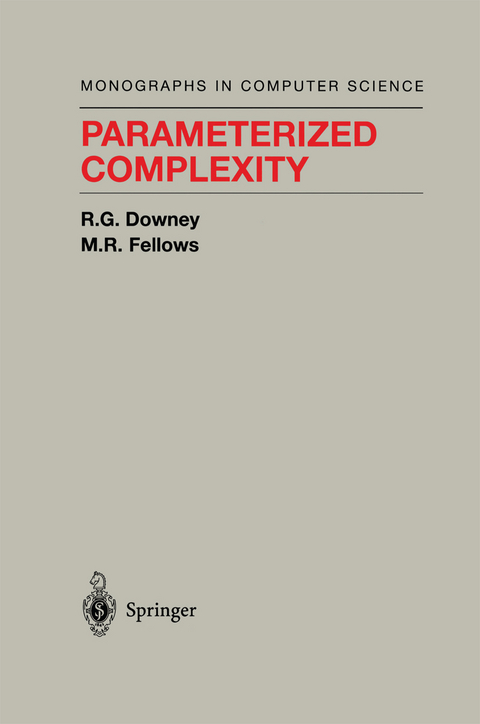
Parameterized Complexity
Springer-Verlag New York Inc.
978-1-4612-6798-0 (ISBN)
1 Computers, Complexity, and Intractability from the Parametric Point of View.- 1.1 Introduction.- 1.2 The Role of Computational Complexity in Modern Science.- 1.3 The Story of Dr.O, Continued.- 1.4 Reworking the Foundations of Computational Complexity.- 1.5 A Deal with the Devil.- 1.6 How Parameters Arise in Practice.- 1.7 A Distinctive Positive Toolkit.- 1.8 O No?.- 1.9 The Barometer of Parametric Intractability.- 1.10 Structural Aspects of Parameterized Complexity.- 1.11 An Overview of Current Research Horizons.- I Parameterized Tractability.- 2 The Basic Definitions.- 3 Some Ad Hoc Methods: The Methods of Bounded Search Tree and Problem Kernel.- 4 Optimization Problems, Approximation Schemes, and Their Relation with FPT.- 5 The Advice View Revisited and LOGSPACE.- 6 Methods via Automata and Bounded Treewidth.- 7 Well-Quasi-Orderings and the Robertson-Seymour Theorems.- 8 Miscellaneous Techniques.- II Parameterized Intractability.- 9 Reductions.- 10 The Basic Class W[1] and an Analog of Cook’s Theorem.- 11 Some Other W[1]-Hardness Results.- 12 The W -Hierarchy.- 13 Beyond W[t]-Hardness.- 14 Fixed Parameter Analogs of PSPACE and k-Move Games.- 15 Provable Intractability: The Class XP.- III Structural and Other Results.- 16 Another Basis for the W -Hierarchy, the Tradeoff-Theorem, and Randomized Reductions.- 17 Relationships with Classical Complexity and Limited Nondeterminism.- 18 The Monotone and Antimonotone Collapse Theorems: MONOTONEW[2t + 1] = W[2t] and ANTIMONOTONEW[2t + 2] = W[2t + 1].- 19 The Structure of Languages Under Parameterized Reducibilities.- IV Appendix.- A A Problem Compendium and Guide to W-Hierarchy Completeness, Hardness, and Classification; and Some Research Horizons.- B Research Horizons.- B.2 A Lineup of Tough Customers.- B.3 ConnectionsBetween Classical and Parameterized Complexity.- B.4 Classification Gaps.- B.5 Structural Issues and Analogs of Classical Results.- References.
| Reihe/Serie | Monographs in Computer Science |
|---|---|
| Zusatzinfo | XV, 533 p. |
| Verlagsort | New York, NY |
| Sprache | englisch |
| Maße | 155 x 235 mm |
| Themenwelt | Informatik ► Theorie / Studium ► Algorithmen |
| Mathematik / Informatik ► Mathematik ► Allgemeines / Lexika | |
| Mathematik / Informatik ► Mathematik ► Angewandte Mathematik | |
| Mathematik / Informatik ► Mathematik ► Graphentheorie | |
| Mathematik / Informatik ► Mathematik ► Logik / Mengenlehre | |
| ISBN-10 | 1-4612-6798-6 / 1461267986 |
| ISBN-13 | 978-1-4612-6798-0 / 9781461267980 |
| Zustand | Neuware |
| Informationen gemäß Produktsicherheitsverordnung (GPSR) | |
| Haben Sie eine Frage zum Produkt? |
aus dem Bereich


